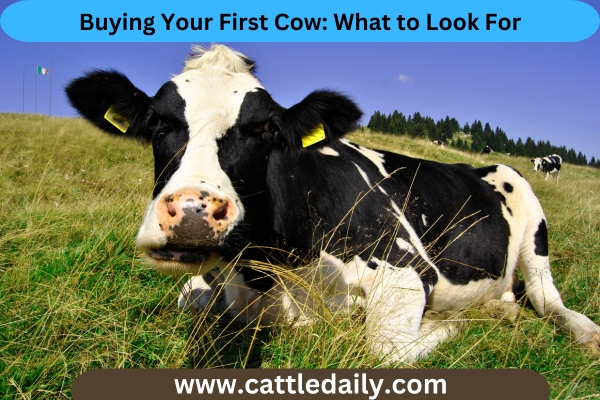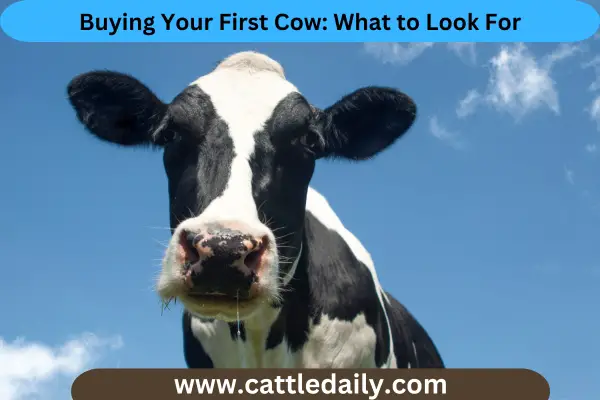Buying Your First Cow
For first-time cow buyers, picking the right bovine companion can seem like a daunting task. With hundreds of cattle breeds to choose from, it’s important to understand what to look for when purchasing your first cow.
Proper selection and preparation will help ensure a healthy and productive animal that will provide years of enjoyment on your farm or homestead. In this blog post, we’ll cover the key things to consider when selecting and buying your first cow.
Essential Considerations for Your First Cow
1. Breed
One of the most important factors is choosing the right cattle breed for your needs and environment. Certain breeds are better suited for dairy production, while others excel at beef production. Consider the climate where you live – some breeds withstand heat better, while others tolerate cold winters well.
Also factor in temperament, as some breeds tend to be more docile. Popular beginner cattle breeds like Jersey, Dexter, or Angus offer good all-around versatility. Partner with a knowledgeable breeder to pick livestock that has been socialized to be gentle when handled.
2. Age
Typically, it’s best to buy cattle between 6-12 months of age for the first herd addition. At this age, they are weaned from their mother’s milk and eat solid food regularly. Younger calves still require extra care like bottle feeding.
Older cows may be more set in their ways. An intermediate age allows you time to get the animal adjusted to its new home and used to your care and handling. Ask the seller about vaccinations and medical history too.
3. Health and Condition
Inspect cattle closely for signs of illness, injury or distress before purchasing. The animal should seem alert with clear eyes and nose. Check for limping, wounds, discharge from the eyes or nose, and diarrhea.
Healthy cattle have glossy coats and strong body conditions without overly prominent bones or sunken areas along their backs. Hoof condition and leg straightness are important too. Only buy animals in good overall health and body condition.

4. Facilities
Before you buy, ensure your farm or property is properly equipped to house and care for livestock. Cattle require sturdy fencing, shelter from weather extremes, and a source of clean water. They’ll also need space for exercise and grazing.
Consult with your local agricultural extension office for guidance on facilities and space requirements for cattle. Having the proper setup ready ahead of time will ensure a smooth transition when your new cow comes home.
5. Ask Questions
Reputable sellers will have no problem answering your questions openly and honestly. Some important things to inquire about are pedigree information, health history, breed registration paperwork, and reasons for selling. Also discuss the expected lifespan, nutrition needs, and personality traits of the individual animal.
Ask if the seller will allow you to keep the cow for a trial period to ensure it’s a good match. Being able to communicate with the seller builds trust in the transaction.
6. Take It Slow
Bringing home a new cow for the first time is exciting but don’t be in a rush. Take time to gradually transition your new bovine companion into your existing herd when bringing her to your farm.
Keep the cow in a separate paddock at first so it can become accustomed to its new home. Slowly introduce any other livestock like horses so they have time to get to know each other safely.
7. Production
Ask the seller about the cow’s anticipated production in terms of milk yield or daily weight gain. Production can vary substantially between breeds and bloodlines. Review records to estimate the cow’s future output. However, good feeding and care on your part help any cow reach optimal production.
8. Temperament
An animal with an even, docile temperament will be much easier to handle and care for. Observe how the cow interacts with people and other farm animals. She should not be overly anxious, aggressive, or skittish.
Calmness indicates the cow is well-socialized. High-strung or nervous behavior suggests a greater risk of injury to you or yourself.
Additional Tips
Here are a few other tips for choosing your ideal starter cow:
- Buy from a reputable breeder or seller with healthy, well-cared-for livestock. Ask questions to establish trust.
- Get a pre-purchase exam by a licensed veterinarian to uncover any health issues.
- Inquire about the cow’s current diet and feeding schedule and make gradual transitions.
- Ensure you can provide the cow with adequate shelter, nutrition, water, and space to thrive.
With research and preparation, finding the perfect first cow can be a breeze. Stay patient, evaluate your options, and focus on health and temperament above all else. Following these guidelines will lead you to a great bovine companion that will flourish on your farm.
Conclusion
Doing research, asking questions, and taking it slowly will pay off when bringing home your first cow. Focus on health, temperament, and facilities preparation to get your new cattle ownership experience off to the right start.
With proper selection and care, your first cow will be the beginning of an enriching and productive venture in raising cattle. Learn here more about cattle farming and tips.
FAQs:
Q: What breed of cow is best for a beginner?
A: Good beginner cow breeds include Jersey, Dexter, Angus, Hereford, and Holstein. They tend to have gentle dispositions and be versatile for both meat and dairy.
Q: What age cow should I buy for my first one?
A: Look for a cow that is 6-12 months old. This allows time to train them while they are still young but past the bottle feeding stage.
Q: How much space does a cow need?
A: Plan to provide at least 400-600 square feet of barn space and 1-2 acres of pasture per cow. The amount varies based on size and breed.
Q: What should I feed my cow?
A: Cows need a balanced diet of roughage like grass or hay plus grain concentrate to provide enough nutrition. Provide free-choice hay and 2-4 lbs of grain mix per day.
Q: How much does a cow cost?
A: Prices vary widely, but expect to pay $500-$2,000 for a healthy young cow depending on breed, pedigree, location, and market conditions.
Q: How do I transport my new cow home?
A: Use a livestock trailer suitable for cattle. Make sure the cow has non-slip footing, ample head room, and ample ventilation.
Q: What special equipment will I need for my cow?
A: Essential gear includes an enclosure/barn, water trough, feed buckets, cows brushes, halters, leads, and hoof care tools.
Q: How often does my cow need veterinary checkups?
A: Schedule an annual vet visit to check health and administer vaccines. Seek immediate vet care if the cow seems ill or injured.
Q: What signs of illness should I watch for?
A: Look for changes in appetite, diarrhea, coughing, limping, discharge from the eyes/nose, lameness, or other abnormal behavior.
Q: How long will my cow produce milk or calves?
A: With proper care, cows can remain productive for 10-15 years. Production declines gradually after about 5-6 years of age.


